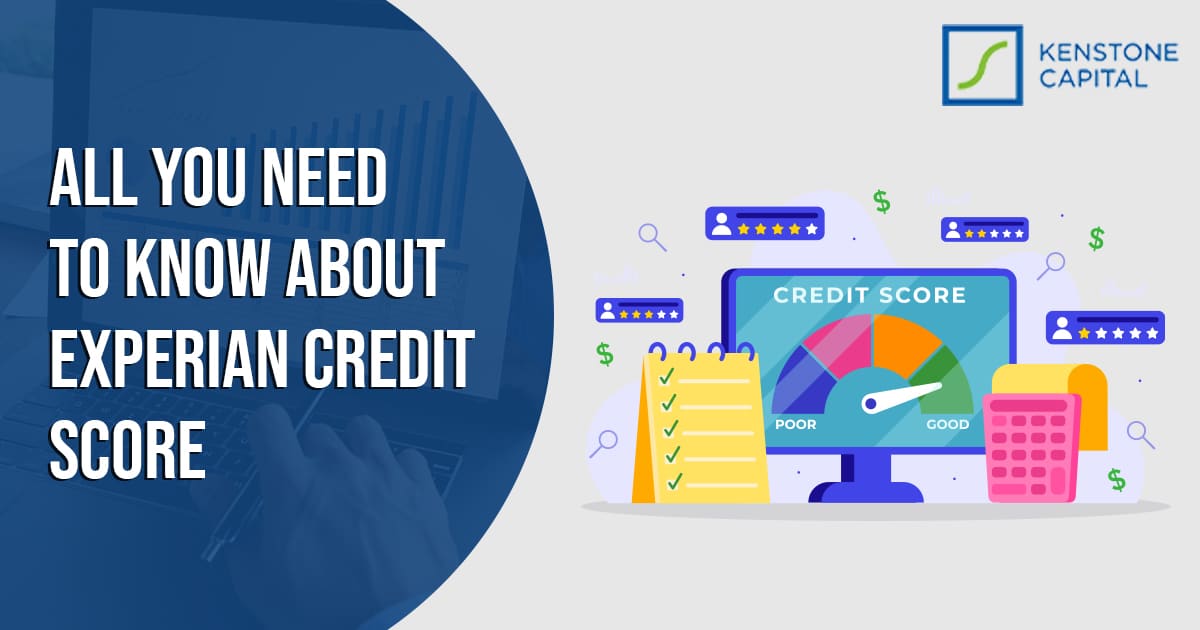All You Need to Know About Experian Credit Score
The Experian credit score is a significant measure of your creditworthiness and overall financial health. If you’ve ever taken out a loan, applied for a line of credit, or even used a buy-now-pay-later option, it’s likely that your Experian score was a key data point in their decision. If you’re considering a home purchase, funding educational and professional loans, applying for any kind of business, or even considering a car loan, knowing how the Experian credit score functions is critical.
This complete guide is going to give you everything you need to know from what an Experian credit score is, calculating what factors affect it, how to increase it and how it compares to other credit scores, such as CIBIL.
What is Experian Credit Score?
Experian is among the largest credit information companies globally, operating in more than 39 countries and has provided credit information for 125 years. It was licensed to operate in India in 2010 and is registered with the Securities and Exchange Board of India (SEBI) and the Reserve Bank of India (RBI).
Experian credit score is a three-digit score ranging from 300 to 900 that summarizes your credit history and repayment behavior. When you borrow money – such as through personal loan, home loan or your credit card – the bank or lender sends your repayment information to a credit information company, such as Experian.
Experian analyzes that information and generates a credit score that reflects your creditworthiness. In other words, the Experian credit score will help lenders determine how likely you are to repay your debt on time.
The Rationale Behind Lenders Checking Experian Credit Scores In The Loan Application Process
If you have ever wondered why every bank or NBFC checks your credit score before providing you with a loan or credit, now you do!
Lenders wants to reduce their risk. When you have a high Experian credit score this tells lenders that you are a responsible borrower, who pays their bills on time with little debt, and the likelihood of your default is very low. With this in mind it is easier for them to approve your application faster and give you much better terms.
Some benefits of having a high Experian credit score include:
- Fast approval of loans- paper work is very minimal and processing the loan will only take a couple of days.
- Better rates- when you have a high Experian credit score, you will most likely get the best rate.
- Higher limits- borrowers with a high Experian credit score often receive the highest limits for credit cards and personal loans.
- Better negotiating position- if you are approved your lender will agree to your request of extending your repayment term or simply lowering your EMIs.
Experian also provides business credit reports for companies and businesses. More often a lender will reference the Experian credit report for a company before extending a business loan, working capital, or credit facilities.
What is a Good Experian Credit Score?
Your credit score is a reflection of your financial discipline. Here’s how Experian classifies scores:
| Experian Score Range | Creditworthiness |
| 750 – 900 | Excellent |
| 700 – 749 | Good |
| 650 – 699 | Fair |
| 600 – 649 | Needs Improvement |
| Below 600 | Immediate Action Needed |
In general, a score of 700 or above is considered good and sufficient for most credit products. However, if you aim for premium credit cards or low-interest home loans, staying above 750 is advisable.
Elements That Influence Your Experian Score
Getting to know what affects your Experian credit score is the first step to trying to improve it. Here are the elements:
1. Credit Payment History
Payment history contributes the largest share to your overall credit score computation. Timely payments on EMIs and credit card bill payments help to improve your score, delayed or missed will negatively affect your score.
Tip: Always keep reminders or turn on auto-pay on EMIs and credit card dues.
2. Number of Credit Enquiries
When you apply for a loan or credit card, the lender checks your credit report with a hard inquiry. When your credit report has multiple inquiries made within a short amount of time, the lender sees “credit hunger” which will set a negative tone for your credit score.
Personal inquiries of checking your credit report (the soft inquiry) do not have a negative effect on credit health.
3. Percentage of Unsecured Loans
The higher the percentage of unsecured loans – for example, personal loans – compared to secured loans (home or car loans) is seen as risky.
Keeping a healthy mix of credit: secured loans, unsecured loans, and credit cards will help improve your credit score.
4. Errors in Experian Credit Report
Sometimes banks or NBFCs report the wrong data. For example, taking a loan that was marked as “settled,” when the loan was actually closed, would lowered your score for no reason.
Make it a habit to check your credit report regularly and if you see inaccuracies, file a dispute with Experian.
5. Credit Utilization Ratio (CUR)
CUR demonstrates how much credit you are utilizing as against the total limit available. For best practice, keep your CUR less than 30%. For instance, if your limit across cards is ₹1,00,000, you should be looking to spend less than ₹30,000 in any one month’s billing cycle.
A high CUR has been known to indicate a reliance on credit and therefore drop your score.
6. Status of Old Loans
‘Settled’ or unpaid old loans that are not closed on your report hamper your creditworthiness. Paying off old dues and closing the loan accounts is therefore positively rewarding on your score.
7. Credit Age
The longer you have had credit, the better. Closing old credit cards (accounts) reduces your credit age, which may impact your score slightly.
Tip: Leave old credit cards four active every month with a small transaction payable each month.
What’s Involved in an Experian Credit Report
Your Experian credit report is a comprehensive report that lenders use to consider your financial behaviours. Key details include:
- Account History – This is a list of your credit accounts, balances, repayment history (for up to 36 months), including the lender’s name.
- Personal Information – This is your name, date of birth, PAN, address and contact information.
- Credit Summary – This is the summary of your accounts including currently open accounts (if any) and status of old accounts, indicating total outstanding balances.
How to Verify Your Experian Credit Score
Regularly confirming your Experian credit score is one of the smartest things you can do for your financial health. It helps you keep track of your credit score, spot any errors early, and make better loan application decisions.
The Reserve Bank of India (RBI) states that each citizen is entitled to one free report from each bureau every 12 months – including Experian. So you can verify your Experian credit score for free at least once a year, without cost or impact on your credit score.
Here’s how you can verify your Experian credit score online and offline:
How to Check Experian Credit Score Online
Viewing your credit score online is the quickest and easiest method, taking only a few minutes throughout the entire process.
Step 1: Visit the Experian Website
Go to the official Experian India website. On the homepage, there will be a prominent link for Free Credit Score, usually at the top left. Click on it.
Step 2: Register Yourself
You will be taken to a page where you can create a new account by clicking register now (only if you don’t have one already) or you can simply log in (if you already have an account).
Step 3: Enter Your Mobile Number
You will need to enter your valid mobile number and click send OTP. In just a moment because you will receive a 6 digit One Time Password (OTP) on your mobile phone that you will enter into the screen and click verify.
Step 4: Fill in Personal Details
You will be asked for details, such as:
- Full Name (as on PAN card)
- Date of Birth
- Gender
- Email ID
- Residential Address
- Identification Number (either PAN, Aadhaar, Passport, Voter ID, Driving License or Ration card)
- Identification Number
Make sure the all details are correct, otherwise your identity will not match up.
Step 5: Accept the Declaration
Click the declaration checkbox that states all provided information is correct and click Get Report.
Step 6: View and Download
Your Experian Credit Report will appear immediately on your screen. You may either check it out online, or you can click on the “Download Report” button to access it in PDF form for reference.
Tip: The above process to check your credit score is considered a soft inquiry and will not affect your score.
Steps to check your Experian Credit Score in Offline mode
If you prefer the physical or paper-based way, or if you need a physical report, you may request on the offline mode.
Step 1: Download the Request form
Go to the Experian India website and download the Credit Report Request form. Please print it out.
Step 2: Supporting documents
You will need to attach self-attested copies of the below-mentioned documents:
Proof of identity
- PAN card, Aadhaar card, Passport or Voter id.
- Proof of Address
- Utility bill statement or Aadhaar card with address with recent bank.
Step 3: Payment
If you are requesting more than one report in one financial year, you will have to pay ₹399 + GST as the fee. You need to make such payment in the form of Demand Draft drawn on – Experian Credit Information Company of India Pvt. Ltd.
Step 4: Send the Documents
Send the duly filled form along with the supporting documents and your payment to the address at Experian Credit Information Company of India Pvt. Ltd.
5th Floor, East Wing, Tower 3, Equinox Business Park,
LBS Marg, Kurla (W), Mumbai – 400070, India.
Once Experian processes your request, the physical credit report will be sent to your registered address.
Ways to Keep Your Experian Credit Score Healthy
Your credit score isn’t just a one-time accomplishment – it needs ongoing maintenance. Here is an elaborate list to maintain your good Experian credit score to help you build and maintain a healthy Experian credit score:
Pay your EMIs and credit card bills on time
- Never miss a payment – A single inadequate payment can harm your score.
- Set such payments on autopay or you can call upon the reminder feature on your devices – it can become exhausting trying to remember all of it.
Avoid taking on too much debt
- Sometimes it can be easy to miss and simply miscalculate your debt to your total income if your income level is fluctuating.
- Only take what you can handle.
Keep old credit cards open
- If you were to close old accounts, this would shorten your overall credit history, which can, in turn, cause a decline in your score.
- Use old credit cards on small purchases and pay it off immediately; this can keep the accounts active yet manageable.
Regularly check your credit reports
- To assist you in making sure there are no errors, fraudulent accounts, or incorrect status of your loans paid off or active.
- If flagged, be sure to dispute it immediately so it can be amended as soon as possible.
Have a variety of Credit Types
A credit mix matters, having a healthy mix of secured loans (Home/Car Loans) to unsecured loans (Credit Cards, Personal Loans) has improved credibility.
Keep CUR at or below 30%
- Example: If your credit limit is ₹1,00,000, use no more than ₹30,000.
- Try not to have too many loan queries run in a small time span
- Too many hard queries, all in 2 or 3 months can rise to disruptions.
Plan Loans in Advance
Before borrowing any money, calculate your estimated monthly installments (EMIs) so you don’t experience pressure to repay it.
If You Can Avoid, Do Not “Settle” Loans
Loan settlements notated as partially paid can hurt your credit score. Make sure to close the loan account by paying off the loan in full.
Contact a Financial Advisor if You Want to
If your score is low enough, a professional can help you with credit, and likely credit score improvement.
How to Get a Loan with a Bad Experian Score
If your Experian score is below 600, it is likely your application will be rejected by most of the traditional lenders. Still, you have other avenues to acquire funds:
NBFC Loans: Non-Banking Financial Companies often have less formal standards than banks to evaluate bad credit. Therefore, applying for a loan at an NBFC can be considered to acquire funds with a slightly higher interest rate.
Secured Loans: Offer the lender collateral such as gold, a fixed deposit, or property, to minimize the lender’s risk.
Peer-to-Peer (P2P) Lending: Sign up for a P2P lending platform such as Faircent or Lendbox and allow them find individual investors to fund your loan on their platform.
Apply with a Guarantor/Co-Applicant: Find one person with a strong credit score to apply with you as a co-applicant, or as a guarantor.
Informal Loan Borrowing: Consider asking family and friends, or borrowing from crowdfunding sources only if you will pay it back.
Experian Credit Score vs. CIBIL Credit Score
Both Experian and CIBIL are SEBI-licensed credit bureaus, but here’s how they differ:
| Aspect | Experian | CIBIL |
| Score Range | 300 – 900 | 300 – 900 |
| Adoption | Growing, used by banks and NBFCs | Widely adopted (90% of banks use CIBIL) |
| Calculation Model | Different weightage on factors like utilization, mix | Slightly different model, may yield different scores |
| Availability | One free report every 12 months | One free report every 12 months |
Because the models differ, your Experian and CIBIL scores may not match. Checking both can give a more accurate view of your credit health.
Conclusion
A good Experian score will lead to better financial outcomes. It will allow you to secure loan approvals faster, to access higher loan amounts and credit limits, and ultimately to secure financial products at lower interest and EMIs. With a good score, you will not only have better negotiating power with lenders, but you will also be able to provide fewer documents to the lender.
If you have a poor score, then work towards stepping up and achieving a solid score – this includes paying your bills and EMIs on time, keeping your credit utilization ratio as low as possible, and monitoring your credit report for any errors on an ongoing basis. You will find that your score improves over time following a planned routine, hence achieving greater financial freedom and security.
FAQs
1. How frequently should I review my Experian credit score?
Generally , it is ideal to review your Experian score at least once every 3-6 months or before applying for a large personal loan or credit card. It is a good strategy to regularly monitor your score so that any errors can be dealt with promptly
2. Does reviewing my own credit score decrease it?
When you review your own credit score this is classified as a soft inquiry and this will not affect your actual score. Only the hard or actual inquiries made by lenders when you apply for credit will incur a temporary effect on your score.
3. What is a good Experian credit score range?
Credit scores from Experian will usually be between 300-900. A score above 750 is generally considered good and will help you qualify for loans and credit cards on favorable terms.
4. How long will it take to improve a low credit score?
It will likely take anywhere from 6-12 months of expected diligence such as consistently paying bills on time, maintaining low credit usage and not applying for too many loans at once to see a measurable change in your score.
5. Can I get a loan with a low Experian credit score?
Yes. However, your options will be limited. You might want to consider a secured loan, NBFC loans that are more lenient with their eligibility guidelines, or apply for a credit loan with a guarantor/co-applicant to boost the likelihood of success.




